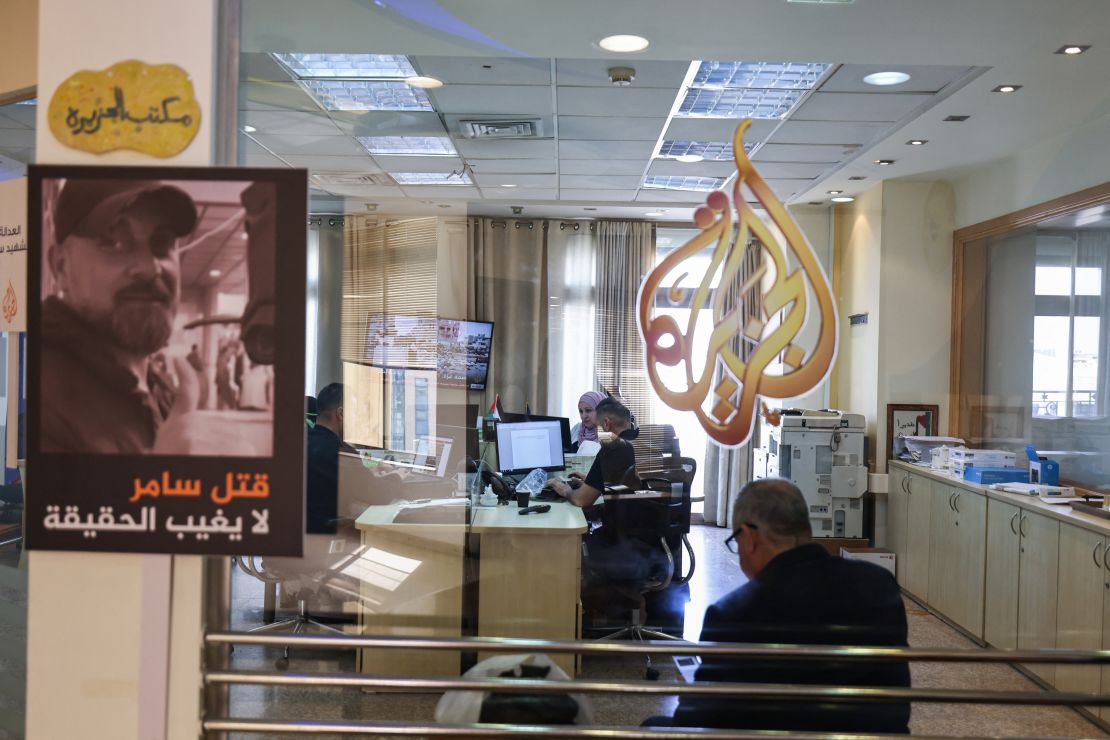CNN
—
The Palestinian Authority has suspended Al Jazeera from broadcasting and operating in the occupied West Bank.
It accused the network of broadcasting “inciting materials” and “misleading reports” that “provoke strife and interfere in Palestinian internal affairs,” Wafa, the official Palestinian news agency, said Wednesday.
“The decision also includes the temporary suspension of all journalists and staff associated with it, as well as the channels under its umbrella, until its legal status is rectified, due to Al Jazeera’s violation of the laws and regulations in force in Palestine,” the Palestinian news agency said.
Al Jazeera condemned the decision, calling it “in line with the practices of the occupation against its crews.”
A video from Al Jazeera shows three Palestinian law enforcement personnel entering a hotel room in Ramallah, in the central West Bank, and handing a letter to journalist Najwan Simri, who then signs it. The letter signed by the Palestinian Authority’s attorney general Akram Al-Khateeb, orders the “banning and freezing of all operations of Al Jazeera Satellite channel and its office in Palestine and freezing the work of all journalists working with the station, crews and affiliate channels temporarily until its situation is corrected due to [Al Jazeera’s] violation of the provisions of the laws and regulations.”
CNN has reached out to the Palestinian Authority for details on the reason behind the decision, and how long the ban will be in effect.
This marks the first time the network has faced such restrictions from Palestinian officials, including the Palestinian Authority which governs parts of the occupied West Bank.
However, Israeli officials have repeatedly attempted to stifle the news network, shutting down its operations in May, seizing equipment, and stopping broadcasts.
Israeli Prime Minister Benjamin Netanyahu’s government has long complained about Al Jazeera’s operations, alleging anti-Israeli bias and accusing the network of being a “mouthpiece for Hamas.” Al Jazeera has rejected the claims as “unfounded allegations.”
Months after shutting down the network’s Jerusalem office, Israeli forces raided and shut down its Ramallah office in the occupied West Bank in September. Al Jazeera said it would “continue reporting on the war on Gaza and the ongoing occupation of the Palestinian territories and the regional escalation.” Since then, employees from Al Jazeera have used the title of “journalist” rather than “network correspondent” when reporting from the West Bank.
Following Monday’s announcement by the Palestinian Authority, Al Jazeera reiterated its “commitment to continue covering events and developments in the West Bank with full professionalism.”
The decision came from the Palestinian Authority’s specialized ministerial committee, which includes the Ministries of Culture, Interior, and Communications, according to Wafa. Lawyers like Muhannad Karajah from Lawyers for Justice – an independent Ramallah-based Palestinian group of lawyers – have challenged the legality of the order which did not come from a judicial ruling.
A controversial operation
In its statement on Monday, Al Jazeera said it “views the Palestinian Authority’s decision as an attempt to deter it from covering the escalating events taking place in the occupied territories.”
“The closure decision comes in the wake of a continuous campaign of incitement and intimidation from entities sponsored by the Palestinian Authority against our journalists,” the news network said. It called the decision “an attempt to conceal the truth of events in the occupied territories, especially in Jenin and its camp.”

The Qatari-based news network, which has produced dogged, on-the-ground reporting of Israel’s war in Gaza, has also extensively covered an operation by Palestinian security forces that began in December, in the occupied West Bank to combat what they describe as extremist “outlaws” in Jenin. The fighting between the Palestinian Authority’s security forces and Palestinian militant groups aligned with Hamas – who accuse the authority of selling out to Israel – has been highly controversial.
Al Jazeera was also criticized by the Palestinian Authority following the network’s coverage of the killing of Palestinian journalist Shatha Sabbagh, whose family accused Palestinian security forces of shooting her in the head on Saturday during their Jenin operation.
In a virtual interview on Sunday with Al Jazeera anchor Ahmed Taha, alongside Sabbagh’s mother, the spokesperson for the Palestinian security forces Anwar Rajab said he was not notified he would be on air with the mother. After listening to her for about three and a half minutes, in which she accused the security forces of killing her daughter, Rajab offered his condolences and then accused Al Jazeera of being “unprofessional” and “taking advantage of people’s suffering and pain.”
After an apology from the anchor for not notifying the spokesperson beforehand, Rajab said the security forces were not responsible for the killing of Shatha Sabbagh and said investigations were ongoing. Following a further heated exchange with the anchor, Rajab accused Al Jazeera of “inciting and leading sedition” before leaving the interview.
Widespread condemnation
Al Jazeera said it was “astonished” by the Palestinian Authority’s decision and said the authority is “fully responsible” for the safety of the network’s staff in the West Bank. The network demanded the authority revoke their decision and allow teams to continue their coverage in the area “without intimidation.”
Others across the Palestinian territories echoed Al Jazeera’s calls for rescinding the decision.
Independent Palestinian politician and head of the Palestinian National Initiative Mostafa Al Barghouti said the network’s Palestinian reporters “face continuous assaults from the occupation” and said the order against it “does not benefit the Palestinian people or their just cause, nor does it benefit those who made this decision.”
The order also drew condemnation from the Palestinian Journalists’ Protection Center, a Ramallah-based NGO that called the decision a “shameful assault on press freedom.”
Hamas condemned the decision as “illegal and unjustified.”
Ibrahim Dahman and Kareem Khadder contributed to this report.




